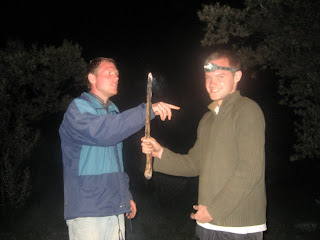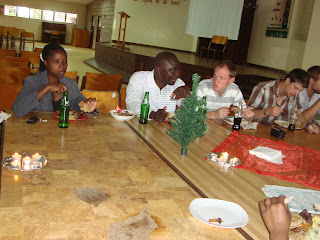Recently I have had several discussions about 1 Corinthians 7, so I felt I would share some of those insights. It is quite an interesting chapter. In the Order of Service of a wedding I just attended, it was described as recommending that we go into marriage discreetly, reverently, and in the fear of God. Now that sounds really good, and I happen to agree, and I think the Bible does support that, but unfortunately that is simply not what 1 Corinthians 7 says. At all.
This is what it actually says: “To the unmarried and the widows I say that it is good for them to remain single as I am. But if they cannot exercise self-control, they should marry. For it is better to marry than to be aflame with passion” (1 Cor 7:8-9, ESV). My summary: marriage should be based upon the foundation of mutual uncontrollable lust. Imagine that as the basis of a premarital counseling class (so now that we have established you are both incapable of self-control and are burning with passion, let us begin…). In the words of Eugene Peterson: “The difficulties of marriage are preferable by far to a sexually tortured life as a single” (1 Cor 7:9, The Message). Nothing mentioned about discretion or reverence or fearing God.
This passage is fraught with interpretive difficulties. Not only do we have a remarkably negative view of marriage, described as a “concession” against the ideal of singlehood (7:6), but we have the challenge of Paul distinguishing between a command from the Lord and his own personal opinion (“To the rest I say (I, not the Lord)” 7:12, ESV). Now how exactly does that square with the notion that “all” scripture is inspired of God (and what “scripture” is being referenced by 2 Tim 3:16)? It’s tricky.
I think the most difficult verse in this chapter is 36. This is how it reads in the ESV: “If anyone thinks that he is not behaving properly toward his betrothed, if his passions are strong, and it has to be, let him do as he wishes: let them marry—it is no sin” (ESV). Now this seems to be saying that if a couple is engaged, and they would like to be “together,” and they get married, they are not sinning. Ok, good, so the transition from engagement to marriage is not inherently sinful. I kind of took that for granted. But how is he “not behaving properly towards his betrothed”? In this translation, it seems to be related to strong passion, but I am not completely sure what that means. Now the NASU puts a totally different slant on this verse: “But if any man thinks that he is acting unbecomingly toward his virgin
daughter, if she is past her youth, and if it must be so, let him do what he wishes, he does not sin; let her marry” (NASU). That is the exact same verse, in a different translation, and it says something completely different. Now someone is “acting unbecomingly towards his virgin daughter”, and apparently this means not allowing her to get married? No mention of passion in this translation. Notice that daughter is not in the Greek, and I have no idea where the translators got that idea.
But the NASU is not the only one that goes with daughter: “But if any man thinketh that he behaveth himself unseemingly toward his virgin (daughter), if she be past the flower of her age, and if need so requireth, let him do what he will; he sinneth not; let them marry” (ASV). On a literal read of this, it would seem that Paul is advocated that if man wants to marry his own virgin daughter, they should get married??? Um surely that can’t be. But if you are saying the father is allowing his daughter to get married, why would you say “they” should get married? Doesn’t make sense.
In Peterson’s translation “his virgin” is demoted to a “woman friend”: “If a man has a woman friend to whom he is loyal but never intended to marry, having decided to serve God as a ‘single,’ and then changes his mind, deciding he should marry her, he should go ahead and marry. It's no sin; it's not even a "step down" from celibacy, as some say” (The Message). That seems a very different idea also, and I am not sure why he interprets it that way.
For those that feel the Greek should answer all of these questions, here you go: Εἰ δέ τις ἀσχημονεῖν ἐπὶ τὴν παρθένον αὐτοῦ νομίζει, ἐὰν ᾖ ὑπέρακμος καὶ οὕτως ὀφείλει γίνεσθαι, ὃ θέλει ποιείτω, οὐχ ἁμαρτάνει, γαμείτωσαν (UBS4). τὴν παρθένον αὐτοῦ does mean “his virgin”, and γαμείτωσαν is 3 person plural, so any translation of let “her” or “him” marry is not correct, but rather a revision to avoid interpretive problems: it says “let them marry”. I don’t know where the ESV got the idea of strong passion (and why they dropped the idea of the virgin being past the prime of her age in some fashion), because it’s not there in the Greek.
Literally, it would something like this: “and if any one doth think [it] to be unseemly to his virgin, if she may be beyond the bloom of age, and it ought so to be, what he willeth let him do; he doth not sin — let him [except as noted above it should be 3rd person plural, them] marry” (Young’s Literal Translation). Doesn’t really help, does it? For those who swear by the King James, the behavior is described as “uncomely”: “But if any man think that he behaveth himself uncomely toward his virgin, if she pass the flower of her age, and need so require, let him do what he will, he sinneth not: let them marry” (KJV).
Well, at least there is no one who could be described as “my virgin”—no daughter, fiancé, or woman friend to whom I am loyal but have now decided to marry, so I don’t need to worry about applying this verse to my life…


 Anson, Kelly and I really tried to climb down into the crater, but didn't make it and had to turn back. It was really rough going, but Anson and I are committed to making it down there. It reminded me a lot of reading The Lost World (Doyle), a great book by the way.
Anson, Kelly and I really tried to climb down into the crater, but didn't make it and had to turn back. It was really rough going, but Anson and I are committed to making it down there. It reminded me a lot of reading The Lost World (Doyle), a great book by the way. We passed some baton of leadership or something like that.
We passed some baton of leadership or something like that.


















